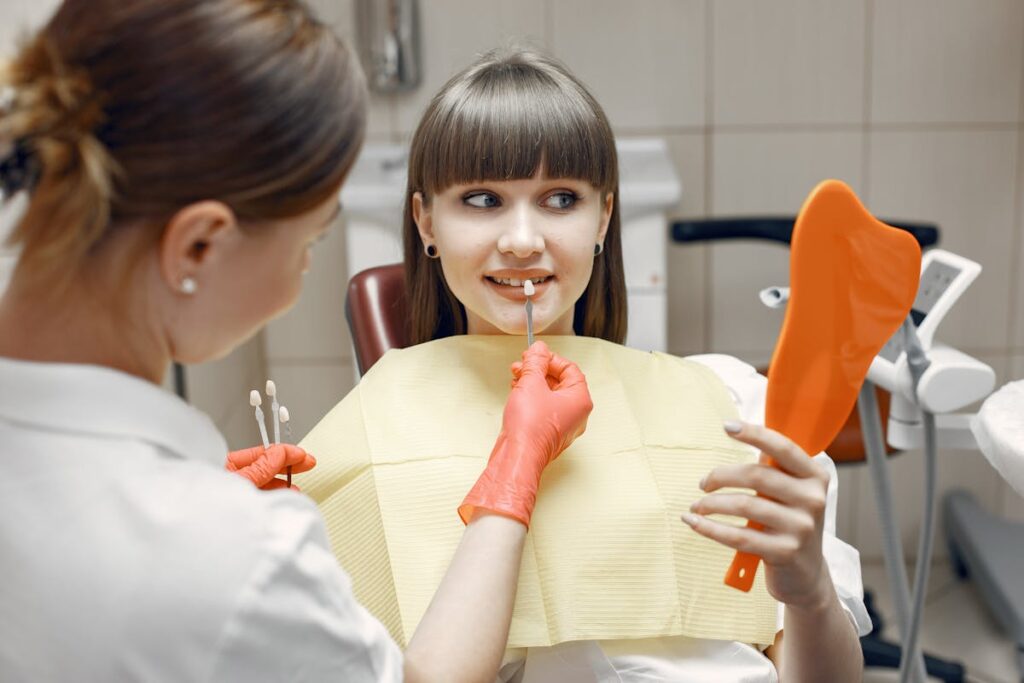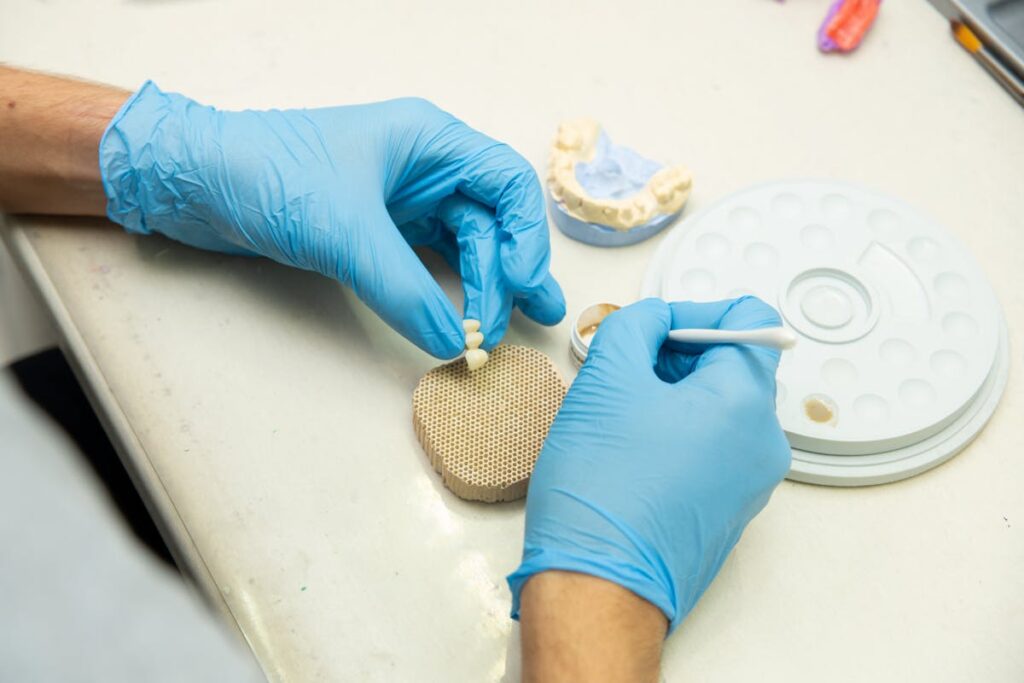Ensuring the longevity of a dental crown requires a careful balance of proper oral hygiene, strategic dietary choices, and regular dental visits. These elements form the cornerstone of dental crown maintenance, providing a shield against potential damage and dislodgement. However, key questions remain on how to navigate the myriad of toothpaste options, and the specifics of a tooth-friendly diet. Additionally, the frequency and importance of dental checkups in maintaining your dental crown are topics worth exploring further.
Understand Your Dental Crown
A dental crown, often referred to as a “cap,” serves an integral role in restorative dentistry. It is a prosthetic device, custom-made to fit over a tooth to restore its shape, size, strength, and appearance.
The crown materials used vary, each having its own advantages and disadvantages. Materials include porcelain, zirconia, metal, composite resin, and porcelain fused to metal. The choice of material depends on various factors such as the location of the tooth, the patient’s preference, the dentist’s recommendation, and cost considerations.
Porcelain and zirconia crowns are popular due to their natural appearance that closely mimics real teeth. Metal crowns, although less aesthetically pleasing, are known for their durability. Composite resin crowns are cost-effective, but may not be as durable. Porcelain fused to metal crowns combine the strength of metal with the aesthetic appeal of porcelain.
Crown longevity is influenced by the material used, the patient’s oral hygiene, and the regularity of dental check-ups. While a dental crown does not require special care, maintaining good oral hygiene can guarantee its longevity. Proper understanding of your dental crown can aid in its protection and preservation.
Regular Dental Cleaning Routine
To safeguard the longevity of your dental crown, maintaining a regular dental cleaning routine is essential. This routine should involve meticulous brushing, flossing, and using mouthwash daily.
Flossing techniques are particularly important for maintaining crown health. Proper flossing should involve gently moving the floss between the teeth and the gum line, ensuring to clean both sides of the teeth. However, extra care should be taken around the crown to avoid dislodging it. Regular flossing helps remove plaque build-up, preventing gum disease which could negatively impact your crown.
Toothpaste selection also plays a critical role in the preservation of your dental crown. Opt for a toothpaste that contains fluoride as it helps strengthen the tooth enamel, providing an extra layer of protection for your crown. In addition, avoid toothpastes that contain abrasive ingredients as they can cause wear and tear to the crown.
Incorporating regular dental check-ups into your dental cleaning routine is equally important. These check-ups enable your dentist to monitor the condition of your crown and address any potential issues early.
Through this robust dental cleaning routine, your dental crown’s lifespan can be maximized, preserving your smile for years to come.
Watch Your Diet
With respect to your dietary habits, paying close attention to what you consume can greatly influence the longevity of your dental crown. The dietary impact on dental health is often underestimated, but it is indeed significant. By observing a balanced diet, you can bolster the durability of your crown and maintain overall oral health.
Primarily, it is essential to maintain a diet rich in vitamins and minerals, such as calcium and phosphorus, which can strengthen your teeth and gums. Consuming foods high in these nutrients can provide additional support to your crown, enhancing its longevity. Avoiding overly sugary foods and drinks, which can lead to dental decay and potentially compromise the integrity of your crown, is also advised.
Moreover, it’s worth noting that acidic foods and beverages, like citrus fruits and sodas, can erode tooth enamel. This can jeopardize the supporting tooth structure for your crown, thereby negatively affecting its durability.
Avoid Hard Foods
Without a doubt, a significant factor in prolonging the lifespan of your dental crown is to avoid hard foods. While dental crowns are crafted to be durable, they are not invincible. Consuming hard or sticky foods can apply undue pressure on the crown, causing it to crack, chip, or dislodge entirely.
The resilience of your dental crown largely depends on the crown materials used during its fabrication. Despite the strength of materials like porcelain, composite resin, or metals, they can still deteriorate under extreme pressure or constant wear and tear. Hard foods such as raw vegetables, hard candies, or nuts can lead to such strain.
Moreover, it’s not just about protecting the crown; it’s about maintaining overall dental hygiene. Hard foods can lodge in between teeth, leading to plaque buildup, which then necessitates more frequent and rigorous cleaning. This could potentially harm both the crown and your natural teeth.
Therefore, to secure the longevity of your dental crown and uphold your dental hygiene, it is essential to avoid hard foods. Opt for softer, healthier alternatives to keep your crown intact and your oral health in check.

Regular Dental Check-ups
Ensuring the longevity of your dental crown goes hand in hand with regular dental check-ups. These routine evaluations are paramount not just for maintaining your overall dental hygiene, but also for ensuring the health and durability of your crown. Typically, dentists recommend having a check-up every six months, though this may vary depending on your individual dental health.
During these appointments, your dentist will carefully assess your dental crown along with the rest of your oral cavity. They will look for any signs of wear and tear, as well as potential issues that may compromise the crown’s longevity, such as plaque buildup or gum disease. If necessary, they will undertake professional cleaning procedures to remove any hardened plaque, also known as tartar, that regular brushing and flossing at home might have missed.
Furthermore, regular check-ups allow your dentist to promptly detect and address any problems with your crown. Early detection and intervention can prevent minor issues from escalating into major complications. In principle, regular dental check-ups contribute greatly to crown longevity and overall dental hygiene, making them a non-negotiable component of maintaining your dental crown effectively.
Frequently Asked Questions
What Should I Do if My Dental Crown Falls Off?
If your dental crown falls off, promptly contact your dentist for crown replacement options. In the interim, temporary crown solutions may be used. Avoid chewing on the affected side to prevent further damage.
Can I Get an MRI if I Have a Dental Crown?
Yes, you can undergo an MRI even with a dental crown. MRI safety isn’t compromised as dental crowns, usually made from porcelain or ceramic, are not magnetic and won’t interfere with the imaging process.
How Can I Tell if My Crown Is Infected?
Identifying crown infection involves recognizing symptoms such as persistent toothache, sensitivity to heat or cold, swollen gums around the crown, and a bad taste in the mouth. These infection signs require immediate dental consultation.
How Does Teeth Grinding Affect My Dental Crown?
Teeth grinding, or bruxism, can greatly impact crown longevity. The excessive force and friction can wear down, loosen, or even fracture the dental crown, undermining its protective function and potentially necessitating replacement.
Does Insurance Typically Cover the Cost of Dental Crowns?
Insurance coverage for dental crowns varies by provider and plan. Most insurance companies partially cover the cost, but the extent depends on the type of dental crown and the policy’s specific stipulations.
